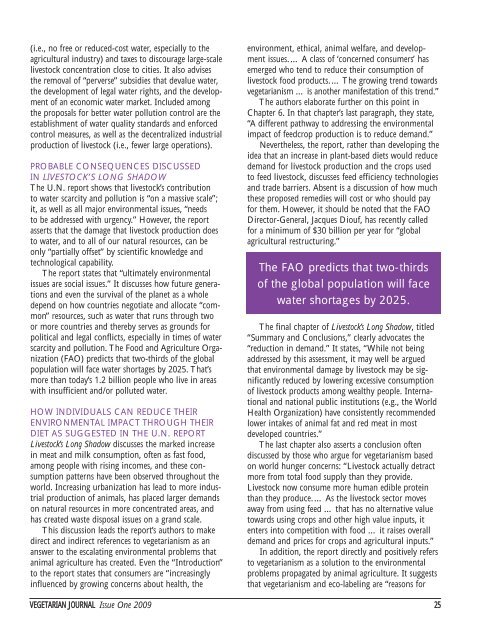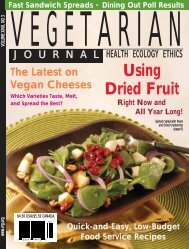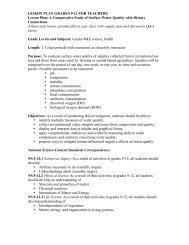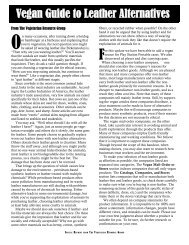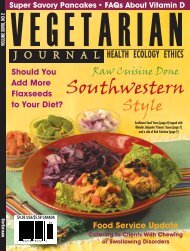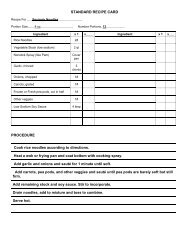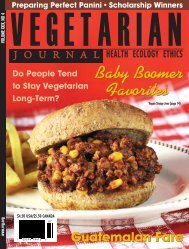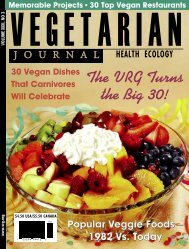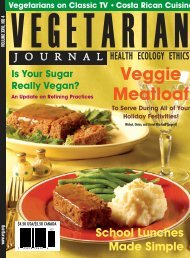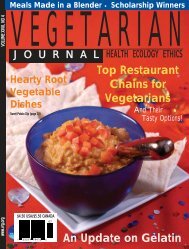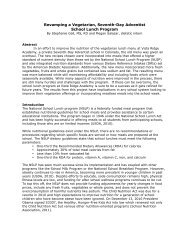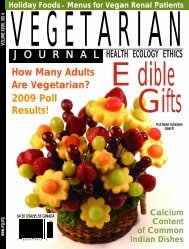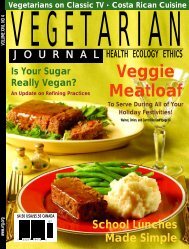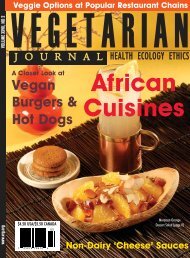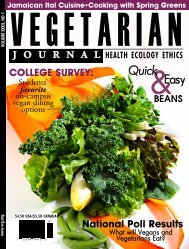Weekend Brunch Ideas - The Vegetarian Resource Group
Weekend Brunch Ideas - The Vegetarian Resource Group
Weekend Brunch Ideas - The Vegetarian Resource Group
You also want an ePaper? Increase the reach of your titles
YUMPU automatically turns print PDFs into web optimized ePapers that Google loves.
(i.e., no free or reduced-cost water, especially to theagricultural industry) and taxes to discourage large-scalelivestock concentration close to cities. It also advisesthe removal of “perverse” subsidies that devalue water,the development of legal water rights, and the developmentof an economic water market. Included amongthe proposals for better water pollution control are theestablishment of water quality standards and enforcedcontrol measures, as well as the decentralized industrialproduction of livestock (i.e., fewer large operations).PROBABLE CONSEQUENCES DISCUSSEDIN LIVESTOCK’S LONG SHADOW<strong>The</strong> U.N. report shows that livestock’s contributionto water scarcity and pollution is “on a massive scale”;it, as well as all major environmental issues, “needsto be addressed with urgency.” However, the reportasserts that the damage that livestock production doesto water, and to all of our natural resources, can beonly “partially offset” by scientific knowledge andtechnological capability.<strong>The</strong> report states that “ultimately environmentalissues are social issues.” It discusses how future generationsand even the survival of the planet as a wholedepend on how countries negotiate and allocate “common”resources, such as water that runs through twoor more countries and thereby serves as grounds forpolitical and legal conflicts, especially in times of waterscarcity and pollution. <strong>The</strong> Food and Agriculture Organization(FAO) predicts that two-thirds of the globalpopulation will face water shortages by 2025. That’smore than today’s 1.2 billion people who live in areaswith insufficient and/or polluted water.HOW INDIVIDUALS CAN REDUCE THEIRENVIRONMENTAL IMPACT THROUGH THEIRDIET AS SUGGESTED IN THE U.N. REPORTLivestock’s Long Shadow discusses the marked increasein meat and milk consumption, often as fast food,among people with rising incomes, and these consumptionpatterns have been observed throughout theworld. Increasing urbanization has lead to more industrialproduction of animals, has placed larger demandson natural resources in more concentrated areas, andhas created waste disposal issues on a grand scale.This discussion leads the report’s authors to makedirect and indirect references to vegetarianism as ananswer to the escalating environmental problems thatanimal agriculture has created. Even the “Introduction”to the report states that consumers are “increasinglyinfluenced by growing concerns about health, theenvironment, ethical, animal welfare, and developmentissues.… A class of ‘concerned consumers’ hasemerged who tend to reduce their consumption oflivestock food products.… <strong>The</strong> growing trend towardsvegetarianism … is another manifestation of this trend.”<strong>The</strong> authors elaborate further on this point inChapter 6. In that chapter’s last paragraph, they state,“A different pathway to addressing the environmentalimpact of feedcrop production is to reduce demand.”Nevertheless, the report, rather than developing theidea that an increase in plant-based diets would reducedemand for livestock production and the crops usedto feed livestock, discusses feed efficiency technologiesand trade barriers. Absent is a discussion of how muchthese proposed remedies will cost or who should payfor them. However, it should be noted that the FAODirector-General, Jacques Diouf, has recently calledfor a minimum of $30 billion per year for “globalagricultural restructuring.”<strong>The</strong> FAO predicts that two-thirdsof the global population will facewater shortages by 2025.<strong>The</strong> final chapter of Livestock’s Long Shadow, titled“Summary and Conclusions,” clearly advocates the“reduction in demand.” It states, “While not beingaddressed by this assessment, it may well be arguedthat environmental damage by livestock may be significantlyreduced by lowering excessive consumptionof livestock products among wealthy people. Internationaland national public institutions (e.g., the WorldHealth Organization) have consistently recommendedlower intakes of animal fat and red meat in mostdeveloped countries.”<strong>The</strong> last chapter also asserts a conclusion oftendiscussed by those who argue for vegetarianism basedon world hunger concerns: “Livestock actually detractmore from total food supply than they provide.Livestock now consume more human edible proteinthan they produce.… As the livestock sector movesaway from using feed … that has no alternative valuetowards using crops and other high value inputs, itenters into competition with food … it raises overalldemand and prices for crops and agricultural inputs.”In addition, the report directly and positively refersto vegetarianism as a solution to the environmentalproblems propagated by animal agriculture. It suggeststhat vegetarianism and eco-labeling are “reasons forVEGETARIAN JOURNAL Issue One 2009 25


